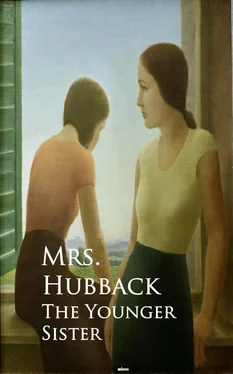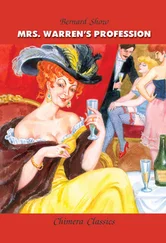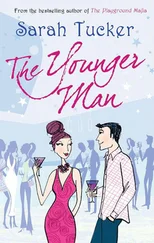Her position, however advantageous, was not long tenable: the summons to dinner was given before she had time to utter more than one remark to Lord Osborne, cutting off his answer, which, short as he usually made his replies, there was now no opportunity to utter. Lady Osborne rose in great state, and giving her hand to Mr. Howard, proceeded to the dining room, through a long range of ante-rooms, where large glasses were so arranged as to exhibit before her, her stately figure, and glance back the lustre of her diamond ornaments. As Elizabeth and Emma followed Miss Osborne and her friend, they could not help wondering at the self-admiration which made it agreeable thus to see nothing but self.
"How dingy we look compared to her ladyship and Miss Carr," whispered Elizabeth to her sister. "I really feel quite ashamed of myself."
"I trust I shall be a little sheltered from her son's eyes," rejoined Emma, in a similar tone, "his stare is quite overpowering; why does he not, sometimes, look at you."
"Thank you, I do not wish it—gracious—six footmen—what can they all find to do in waiting," this ejaculation was uttered almost inaudibly—they having reached the dining-room, where Elizabeth was too much awed to speak.
Lady Osborne did not sit at the head of her own table, and her two young visitors were seated on either hand of Miss Osborne on the opposite side of her ladyship. Immediately that she perceived how they were about to be arranged, Emma contrived to seat herself as far as possible from their host, and by that means became the neighbour of Mr. Howard. She fancied he perceived the object of her manœuvres, for a sort of half smile passed over his face, and he looked either amused or pleased, she could not tell which. He did not address her, however, and as Miss Osborne turned to converse with Elizabeth she sat for some time silent. But as dinner advanced, just as her ladyship was detailing to Mrs. Willis some events in the village which required superintendence, and whilst Miss Carr was making a lively attack on Lord Osborne—about his absence of mind during the dinner, Mr. Howard enquired whether her curiosity was gratified. Pleasure that he should once more resume a tone of friendship, brought a lively colour to her cheeks, and so sweet a smile to her lips, that he must have been very insensible to admiration of beauty, had he been able to resist the attraction. He continued the conversation as long as Lady Osborne's narrative served as a screen to them, and though, when that drew to a close, he found himself compelled to transfer his attention to their hostess, the impressions left by his look and tone were so very pleasing, as quite to rescue the dinner from a charge of stupidity which Emma had previously been meditating to bring against it. It was lucky that she had this little diversion, for otherwise her share of amusement would have been small. There was not a great deal said at dinner, and of that little comparatively a small portion fell to her lot.
It was over however at last, and when they had reached the drawing-room to which they were ushered, in almost as much form as they left it, though their conductor was now only the groom of the chambers, Emma hoped she might find some little relief from insipidity: nor was she disappointed; whilst Lady Osborne was sipping coffee, and prosing to Mrs. Willis, her daughter drew her younger guests into a smaller room, which she assured them was her own particular domain; here establishing themselves comfortably round the ample fire, they fell into a lively and pleasant chat, such as any three girls might be expected to do; presently they were joined by Miss Carr.
"Your lady-mother," said she, "is so deep in village politics with Mrs. Willis, that I am sure I must be
de trop
there, and I have, therefore, absconded here."
She seated herself as she spoke in the chimney corner on a low ottoman, and spreading out her hands to the fire; she said—
"Don't let me stop you unless you were talking of me, Miss Emma Watson, it is your turn—what do you think?"
"Think of what?" enquired Emma, rather startled by the keen eyes fixed on her—it seemed always her fate to be stared at unmercifully.
"Think, oh, of anything—of Mr. Howard for instance—what do you think of him?"
"That he carves very well," returned Emma laughing.
"Well, that is something—a good quality in the master of a house; I commend it seriously to your attention."
"I should think the gentlemen would not sit very long," observed Miss Osborne, "and when they come we must all adjourn to the drawing-room, for mama will wish to sit down to cards. I hope you can play cards."
Her visitors assented, Elizabeth asserting that she was very fond of them.
"And you, Miss Emma Watson," cried Miss Carr, "do you not delight in cards—you answer with a degree of coldness that speaks rather of indifference on the subject."
"I can play if necessary," replied Emma, "but there are many occupations I prefer."
"But you shall not be obliged to make martyrs of yourselves," said Miss Osborne good-humouredly. "If you prefer it you shall sit here, either or both of you, but we do not play high."
Nothing remarkable occurred during the rest of the evening; a dull, leaden state seemed to pervade everything, and both the Miss Watsons felt an inclination to yawn, which they dared not indulge in so august a presence. They were very glad when the time for taking leave arrived, and the enlivening bustle of putting on cloaks and fur boots quite aroused them. Lord Osborne looked on whilst Mr. Howard was wrapping up Emma, with a degree of attention which held out fair hopes of his soon learning such a lesson by heart.
"I shall come down and see you to-morrow," said he.
"It seems warmer to-night," observed Emma, "don't you think we are going to have a thaw? perhaps we may get home to-morrow."
"I hope you are not weary of us," said Mr. Howard, in a cordial voice; "if the weather does not change till
we
wish it, we shall keep you prisoner some days yet."
"Thank you," said she—she wanted to say something more but did not know exactly what, and they reached the carriage before she had made up her mind.
The bright fire which was burning in the comfortable little drawing room at the parsonage, irresistably invited them to enter and draw round it, before separating for the night. Their drive had dispelled their sleepiness, and they were all four in good spirits: it was just the time, the situation, when reserve seems naturally cast aside, and friendly chat and the merry laugh go round unrestrained.
"Well, Miss Watson," said Mrs. Willis, "is your curiosity gratified? how do you like the Castle? are you envious of their state?"
"No, I think not," answered Elizabeth reflectingly, "there are some things I should like, but much that would be troublesome. I dare say Lady Osborne has no worry about housekeeping, but then
I
should feel the responsibility of having so many dependent on me."
"And what part would you chose of her ladyship's manner of living?" asked Mr. Howard, "her jewels perhaps—or her six footmen?"
"Neither," replied Elizabeth, laughing a little; "I am used to wait on myself, and should feel it a great restraint to be obliged to wait whilst others waited on me. I could not help thinking of what my father used to say, when Lady Osborne's maid was so long bringing her ladyship a shawl. 'If you want to be served, send—if you want to be
well
served, go.' That was his motto—and though he never acted on it himself, I think I do—and would rather run up three pair of stairs myself, than wait whilst another does it."
"I admire the activity and independence of your spirit, Miss Watson," replied Mr. Howard; "but you have not yet told me what it is you do envy."
Читать дальше












